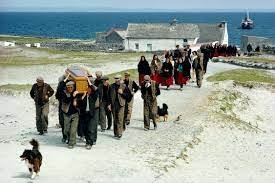“My Father’s Wake: How the Irish Teach Us to Live, Love and Die” by Kevin Toolis
As I sit in my home on the outskirts of a city rocked by the tragedy of another school shooting, I find myself wishing there was something I could do with all this grief. The tricky thing about being a griever with control issues is that I want a fix, a solution, a way to transform my discomfort into something helpful…and maybe a mute button.
Our book club met this week, one night after the brutal attack on our school children and we discussed acclaimed writer and filmmaker, Kevin Toolis’ memoir of his father’s death, “My Father’s Wake: How the Irish Teach Us to Live, Love and Die”.
There are many remarkable things about this book: its lyrical cadence, the majestic scenes of Ireland’s rocky coast and ruddy people, the wise quotes that had me jotting nearly half the book down in my journal. But the thing that is sticking with me most today is the practice of attending the dying and honoring death as demonstrated by the culture of the Irish.
Image credited to: Jim Sugar
“Funerals are public events, a communal act of kinship. An affirmation that the life of the dead man or woman meant something, that they are no longer with us, and that it hurts to lose them,” Toolis writes.
As I think through the feelings of grief erupting within myself, I crave the Irish traditions around death and mourning that Toolis described. I want to keen for the losses of our community, to rock and wail and sing and connect to something ancestral and deep within this place of hurt. I want to honor with my own presence the deaths that we have felt, to stand witness to their families that their losses are known and seen and mourned. I want to recognize the delicacy of life and the wreckage that death can leave behind. I want to return to the traditions we’ve passed down since we were Neolithic, our ancient funeral rites, our open lamentation of the dead and our common unity around the dying that is “as old as the human story”.
Perhaps there will be a time where this feels appropriate and not like a violation of privacy in the wake of a massive and violent trauma. Or maybe this desire to perform “an act of mourning, a ritual of passage, a communal renewal” will prompt the necessary movement toward actual change. May we all sit in our discomfort long enough to be moved by it, one person at a time, until we gain momentum to progress this culture out of its idle paralysis amidst the persistent massacre of our children.
The names of the 6 victims of the Nashville School Shooting on 3/27/2023.



